The 18 Greatest Rock Bands of the 1990s, Ranked
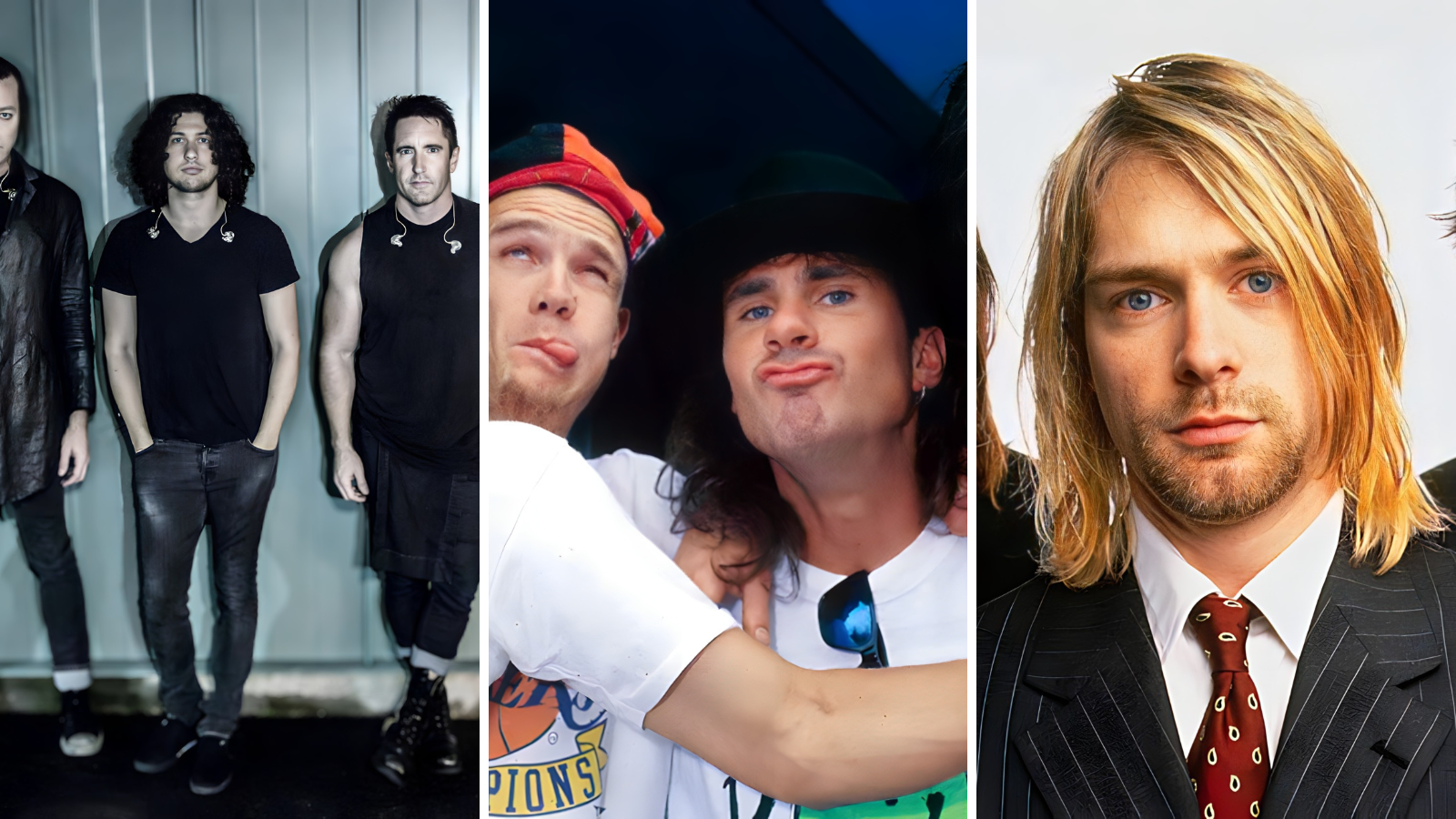
90s rock songs never go out of fashion. Over thirty years on from Nirvana’s trilogy of teenage wasteland records, many top rock bands of the 1990s still hold the apathetic youth of today spellbound; their basement vibe empowering a deep-set love for real, band-written music, distinctly removed from the soulless songwriting process behind vast swathes of commercial hits.
Our collective memory of 90s rock bands might be nostalgia-fueled, rose-tinted, and all that jazz. However, looking back, this legendary era is entangled with some of the last authentic rock groups to hit the top spots on the music charts consistently.
From Brit-pop wonders to US anti-heroes, our list collects the top 18 rock bands of the 1990s, in no particular order, each as influential upon the future of rock as the last.
1. Nirvana
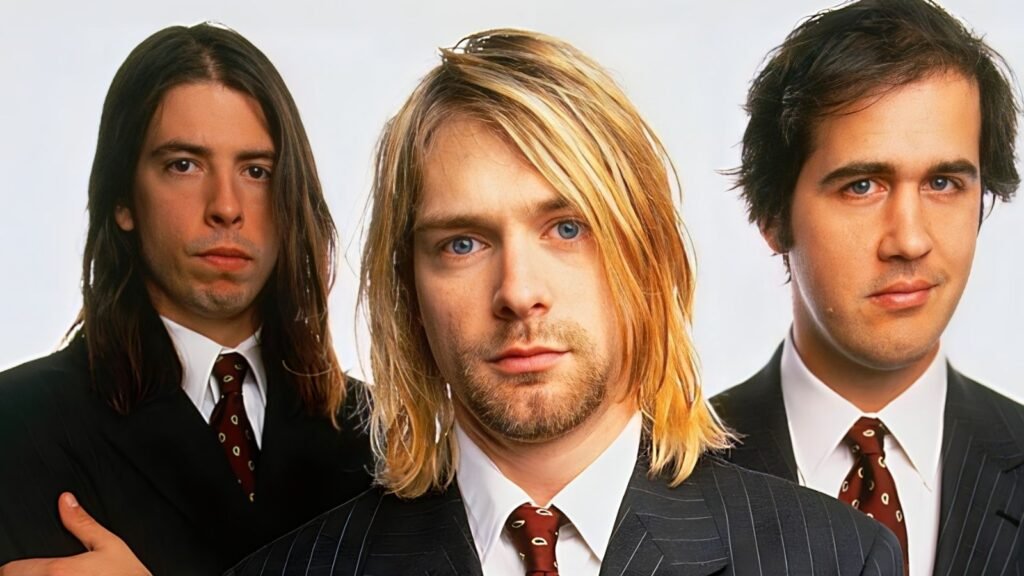
Nirvana’s three-piece discography signaled a 180-degree turn from the 1980s pop/rock scene. Abandoning the new wave synth sound adopted by a host of late-80s rock bands, Nirvana crawled back to the roots of rock music, their sound an embodiment of hopeless youth, general disinterest, and soft-form anarchy against the clean-cut norm.
Doubtlessly one of the most influential early 90s rock bands to have surfaced, each of Nirvana’s records is a through-and-through hit in its own right. Not only is the Nevermind album cover seared into every alternative kid’s mind, but tracks like Smells Like Teen Spirit are dangerously overplayed to the ironic extent that Nirvana’s modern radio audience is almost as jaded to their music as the band was to the world. But despite the inescapable nature of their hits, Nirvana remains an icon of the rock scene, trailblazing a movement that would soon come to define 90s rock music: grunge.
2. Oasis
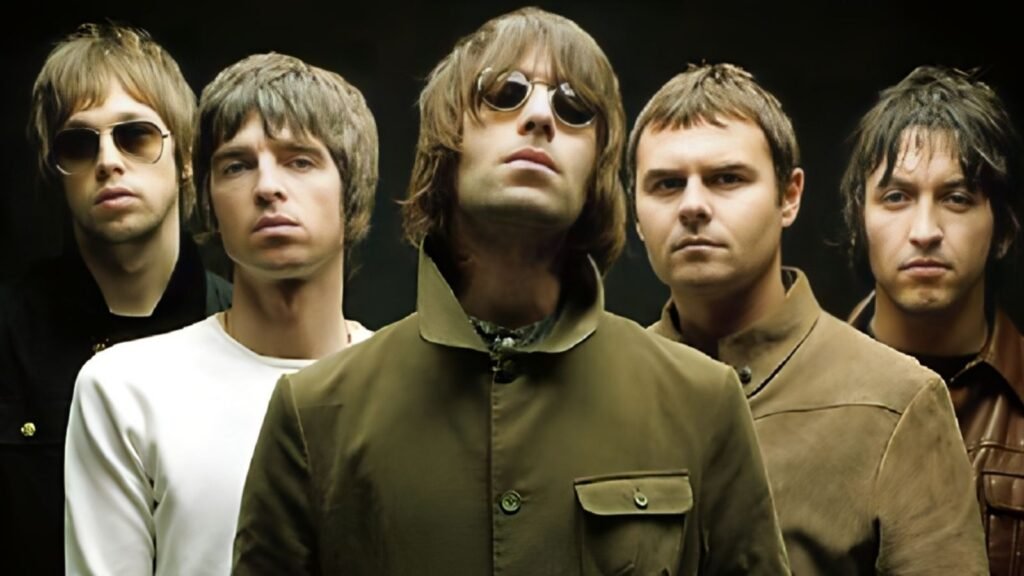
Oasis found equal levels of fame and hatred with their apathetic take on rock ‘n’ roll, a musical aura of general distaste and disillusionment that filled the vacant space left after Kurt Cobain’s death in 1993.
Oasis likely never intended to carry forth the torch Nirvana ignited. Still, their 1994 debut album, Definitely Maybe, released only a year after Nirvana’s closure, filled the youth’s void of chart-topping punk ideals, reincarnating that grungy, 90s flavor of carelessness every mopey teenager craves.
Despite their gradual degradation through the early 2000s, Oasis’ first two records were game-changers, marking a revolt against synthetic pop and a return to a Beatles-style songwriting process. With nonsense lyrics, simple chords, and a frontman who thought he was the new John Lennon, Oasis’ music rattled as many as it rocked, yet their tapestry of 90s rock hits (including Rock N Roll Star, Live Forever, Wonderwall, and Don’t Look Back In Anger) make them one of the most quintessential and cherished of all British 90s rock bands.
3. Smashing Pumpkins
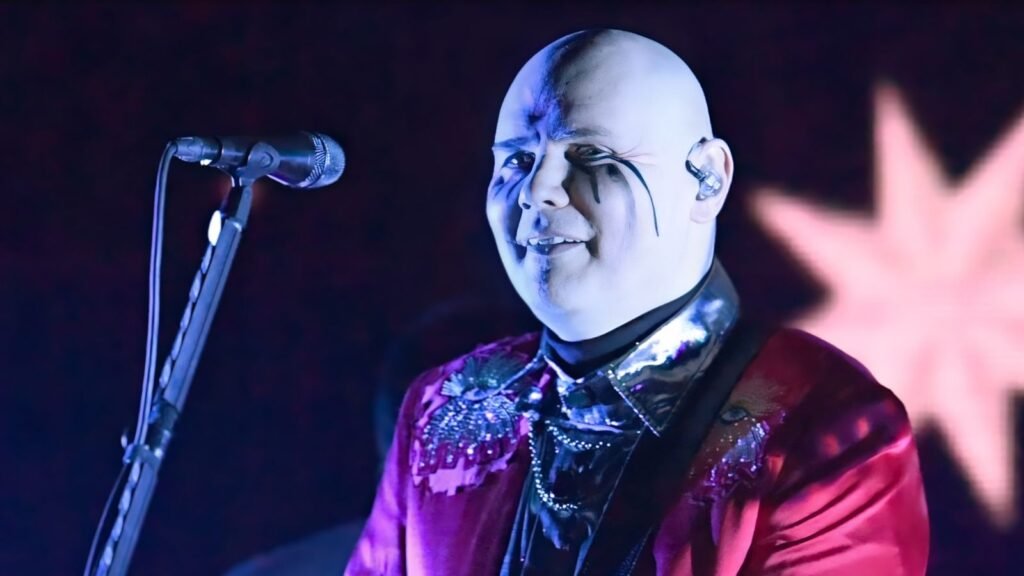
Smashing Pumpkins’ first album Gish, was released in 1991, followed up by three Top 10 records later that same decade. With a collection of charting singles in the US and UK, Smashing Pumpkins designed a style that cherry-picks the best of alternative music, making them one of the most instantly memorable and famous 90s rock bands.
This band defined punk rock as the century came to a close whilst ripping apart its foundations in the process. Streamlining soft psychedelia into their grunge-tinted basis of indie rock ‘n’ roll, Smashing Pumpkins’ rawness resounds with a fresh air of anarchy, topped by an odd, warm comfort as their sound backtracks through varied influences of prior decades.
4. The Offspring
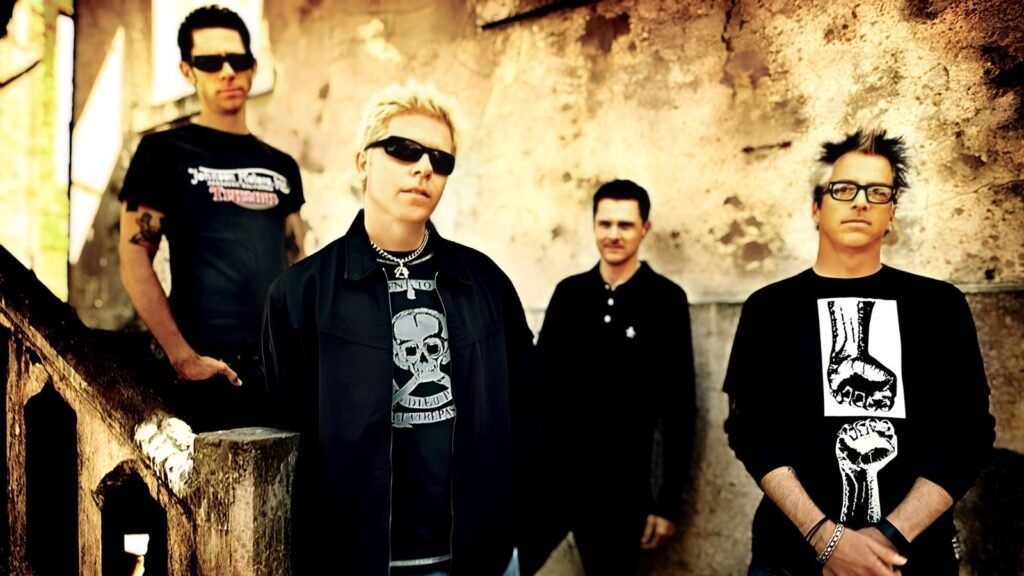
While Smashing Pumpkins was one of the most successful rock bands of the decade, The Offspring took the crown as one of the 1990s’ most successful punk bands. Threading songs with a fearlessly feel-good disdain, this band was met with shocking levels of commercial acceptance for an inherently anti-commercial punk band, hitting #1 on the charts with Pretty Fly (For A White Guy) in 1999, and #2 with follow-up single Why Don’t You Get A Job.
Of all the late 90s rock bands to sear their name into the scene, The Offspring’s early music stays fresh even 30 years on, fuelled by simple, cut-throat tones and the sense of a party-turned-riot, slitting through musical over-saturation with compelling authenticity.
5. Green Day
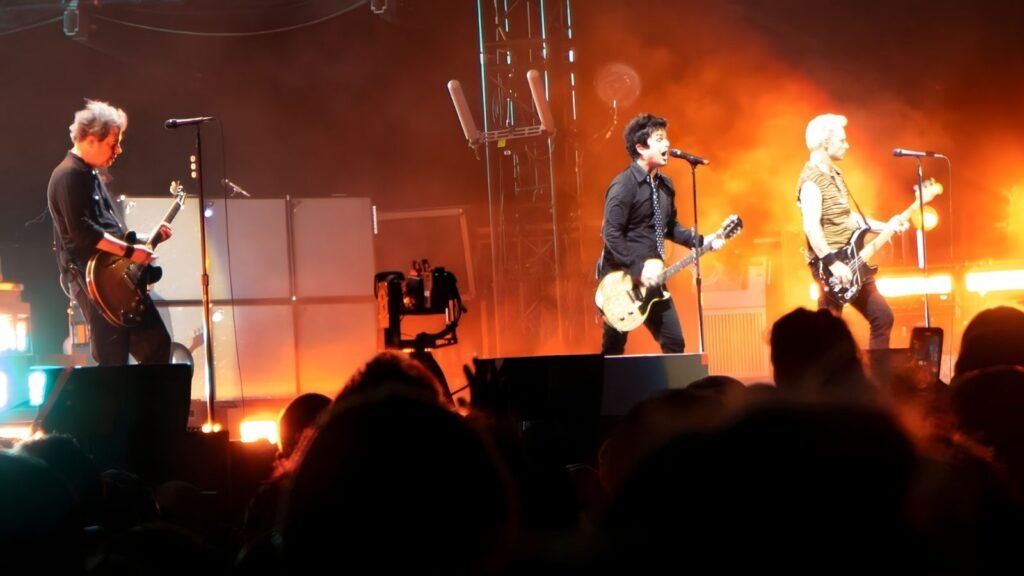
The 1990s was an iconic era for Green Day, a staple punk trio that pushed the genre through the early decade and up to the present day.
Debuting in 1990 with 39/Smooth, the 1990s saw the release of Kerplunk, Nimrod, Insomniac, and one of the band’s all-time greatest albums, Dookie — bearer of Green Day’s first #1 single on the US Alternative charts: Basket Case, often listed as one of the best ‘90s rock songs to ever reach release.
Green Day’s early sound runs fresh with themes of grunge, punk, and misery; so fresh in fact that the band has been chasing the allure of their original sound ever since. They might be best known for their 2004 rock opera album, American Idiot, but Dookie earns Green Day a spot on our list, capturing the 90s in a nutshell whilst resounding with just as much relevance today.
6. Blink 182
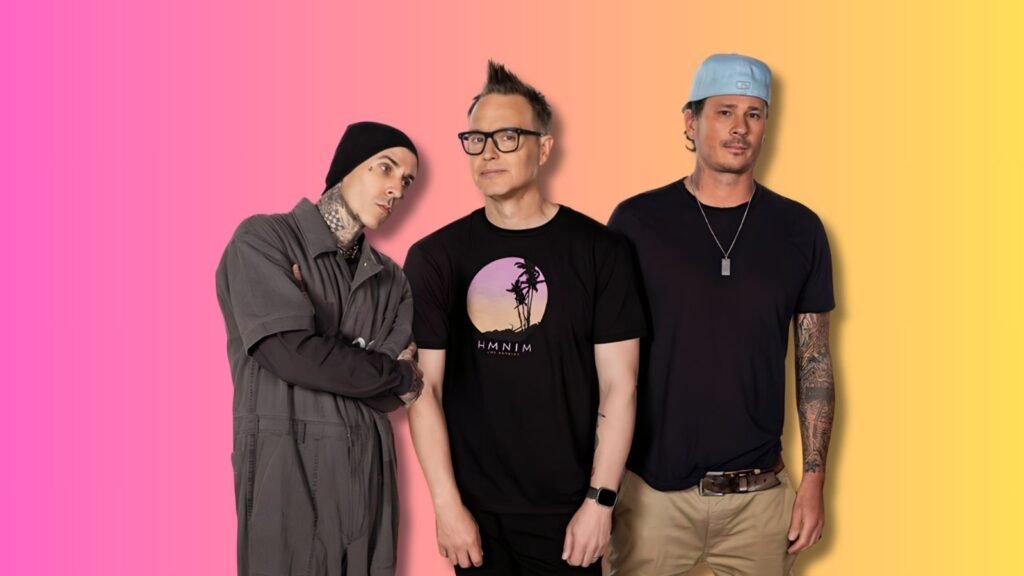
One of the biggest pop-punk bands of all time, Blink 182, shot to fame in the late 90s; their tongue-in-cheek tracks are half-comic, half-profound, and thundering with all-too-relatable teen themes. Aside from creating one of the most iconic album covers of their genre (1999’s Enema Of The State), Blink achieved their status amongst the ‘90s greats for designing a sound so influential that swathes of post-2000 pop-punk bands continue to cite them as a musical influence.
7. Pearl Jam
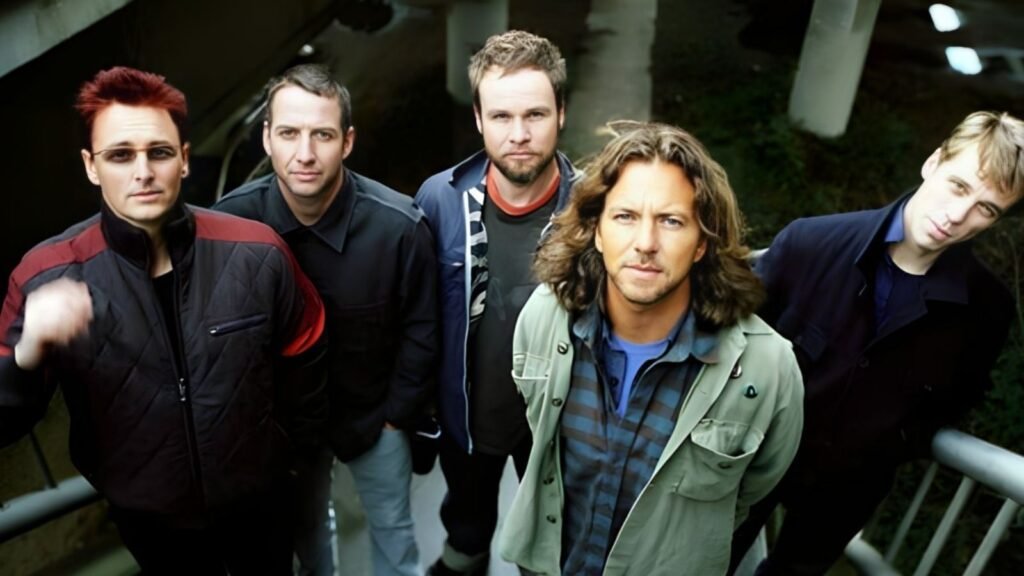
Formed in 1990, Pearl Jam held an undeniable command over the coming decade of rock. Scoring three US #1 albums in a row with 1993’s Vs., 1994’s Vitalogy, and 1996’s No Code, Pearl Jam broke fearlessly into the mainstream consciousness, treading the muddied grounds of hard rock-meets-grunge and shaping the genre as we know it today.
Following the band’s biggest hit singles, Even Flow, and Alive, Pearl Jam found equal levels of respect and notoriety for tracks such as Jeremy, working obscure political sentiments into their music and videos (or artistic lack of) whilst giving voice to the ideals of their underdog generation; true grunge style.
8. Metallica
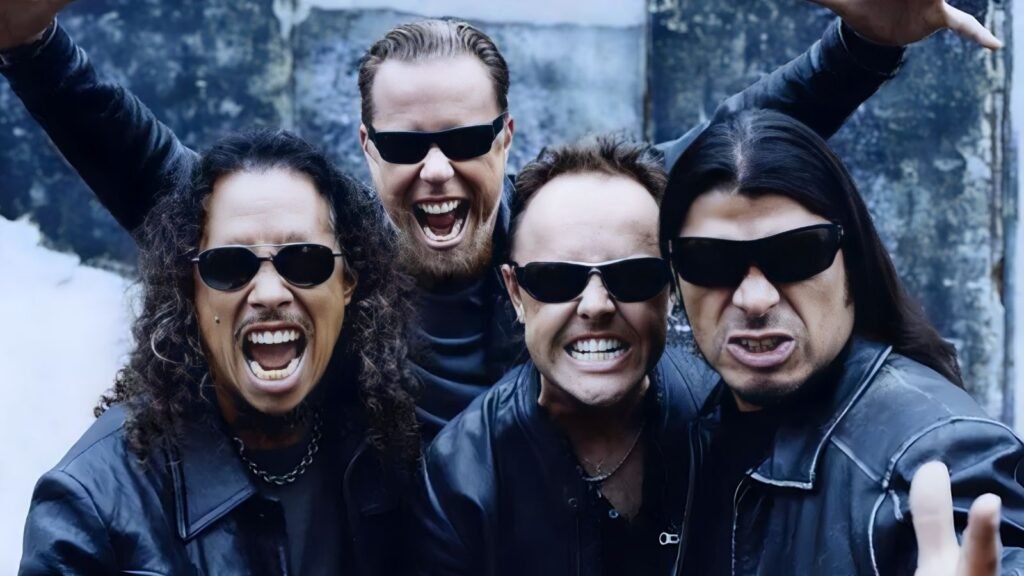
Metallica’s golden age struck like lightning through the 1980s metal scene, but it was their 1991 album, the self-titled Metallica, which seared their name into the mainstream rock world, bestowing an immovable title of greatness, no matter how far the band fell post-90s.
Held by many as the last A-grade album of Metallica’s discography, the colloquially titled Black Album hit #1 in nine countries, led by its storm-clouded first single, Enter Sandman — which possesses one of the most recognizable rock riffs of the decade. Followed by 1996’s Load and 1997’s Reload, the 90s saw through the striking change from Metallica’s early thrash era to their later heavy metal sound, an evolution built on a foundation of alternative hits, each seeding their legacy deeper amongst the most popular 90s rock bands.
9. Radiohead
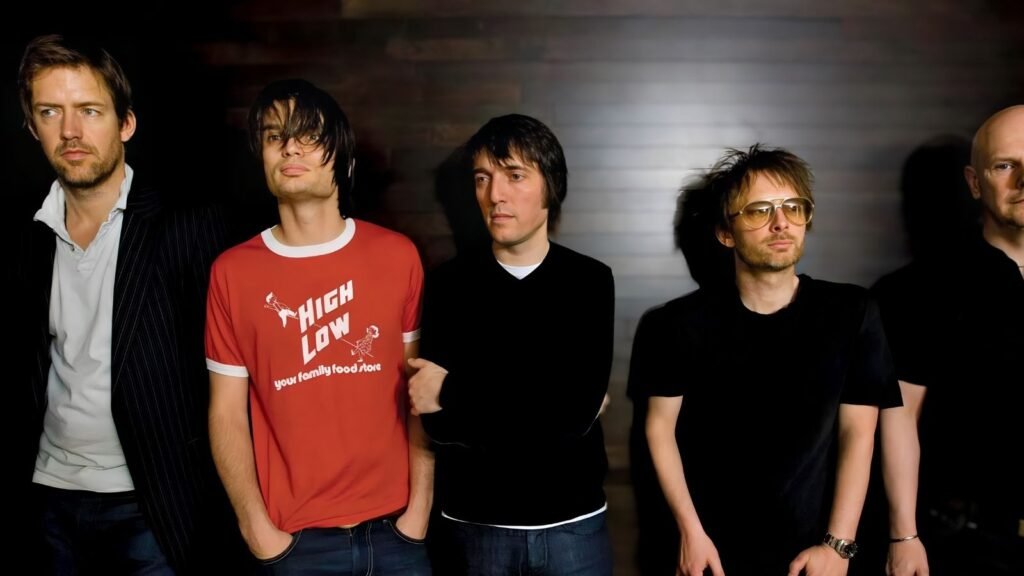
Back in the realms of indie rock, Radiohead took the alt world by storm with their ‘92 debut single, Creep, a British extension of the US grunge phenomenon. Often named amongst classic 90s rock bands such as Oasis, Radiohead’s peculiar exploration of sound separated them from the common batch.
With hectic atmospheres spotlighting a sharp balance of futurism, prog-pop, and old-school rock, Radiohead drew inspiration from across the spectrum of music, from frontman Thom Yorke’s teen idolisation of Neil Young to their subtle entanglement of Chopin melodies within their tracks (just listen to Radiohead’s ‘97 album track Exit Music For A Film next to Chopin’s Prelude #4).
10. Deftones
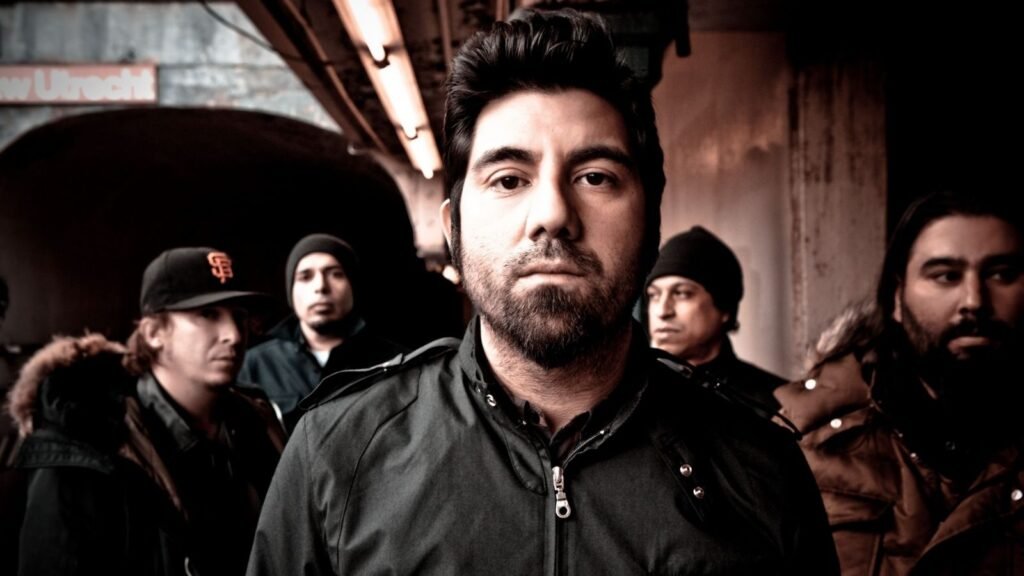
Deftones’ debut release hit the record stores in 1995; their metal-flushed music was a distinct switch-up from the grunge aesthetic, yet truly rock in its own right. The band’s ground-breaking interpretation implants a melodic twist deep within the crushing distortions of heavy metal, wedding pop beauty, rock sleaze, metal brutality, and flairs of indie through each of their 90s records.
Vocalist Chino Moreno described Deftones’ irreplicable sound in his 2020 interview with NME: “That yin and yang of what we’ve always done makes us who we are. We’ve never just been a metal band, we’ve never just been an alternative band, we’ve always just been us. We feel comfortable in never having to choose.”
While some of Deftone’s biggest hits were captured on their 2000s releases, their two 90s albums, Adrenaline and Around The Fur, formed a solid basis for the band to evolve their untamable tincture, with an abrasive sound that stood out from the crowd from the start.
11. The Verve
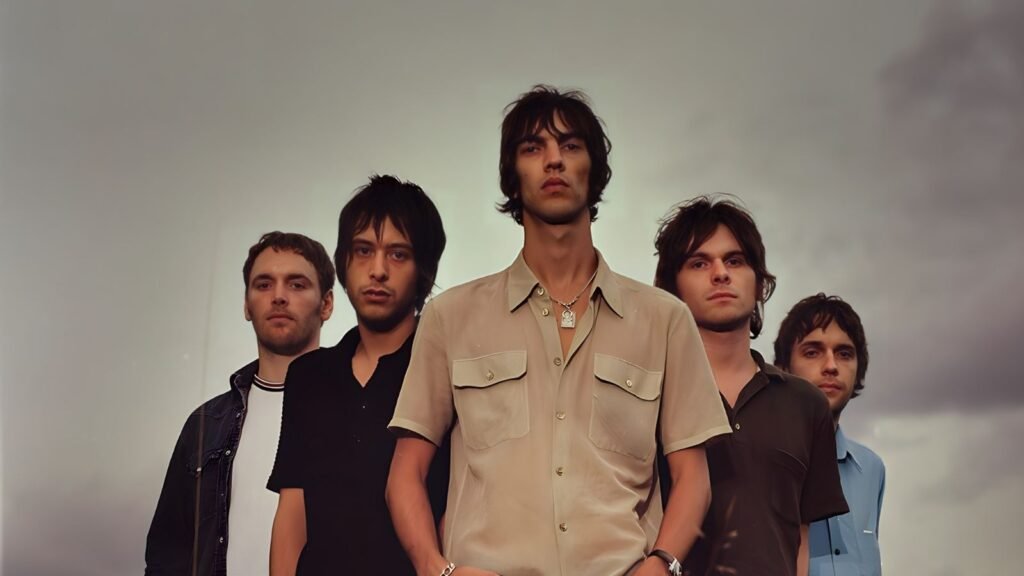
The Verve found ‘90s stardom with Bittersweet Symphony — the iconic Brit-pop track with pure-grunge attitude: “’Cause it’s a bittersweet symphony, that’s life, tryna make ends meet, you’re a slave to money then you die.”
Their ‘97 album, Urban Hymns, shot to #1 in the UK charts, reigniting the power of psychedelia, progressive rock, and stoner music in the UK scene, a kaleidoscopic mirror of what was going down overseas in the US. This record remains in the top 20 highest-selling albums of all time in the UK, a testament to The Verve’s spellbinding authenticity during an era over-saturated with disenchantment.
12. Slowdive
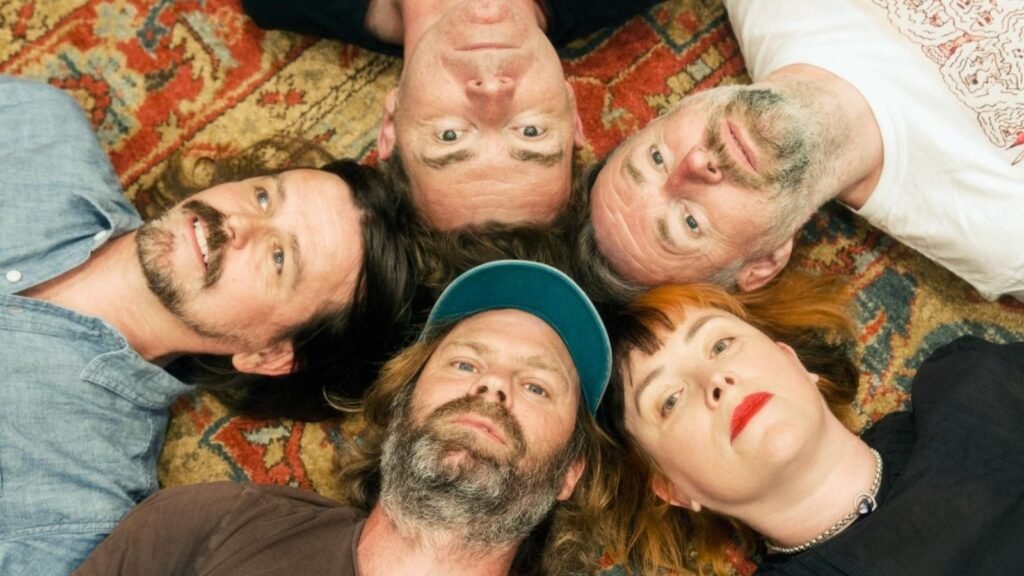
Slowdive has always perched on the obscurer side of fame but remains an acclaimed 90s rock artist in their downtempo niche. Hailing from Reading, England, Slowdive was a pioneering band of the reverb-drowned ‘90s shoegaze movement — a melancholic and wistfully dismal strain of dream pop.
Formed from a synthesis of pedals and threads of Cure-like new wave, Slowdive’s early ‘90s records were met with their fair share of disappointing reviews for their sound’s opposition to the all-consuming grunge rock scene. But this initial ‘90s trilogy — Just For A Day, Souvlaki, and Pygmalion — paints the first signs of life upon their genre’s canvas, a hypnotic basis for shoegaze to mutate and thrive in its underground dwelling.
13. My Bloody Valentine
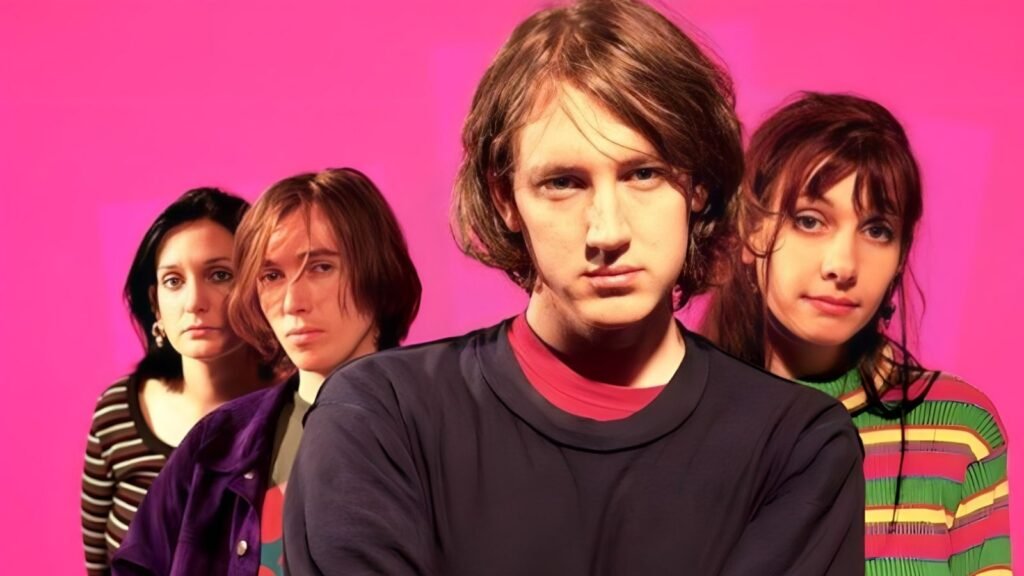
One of these shoegaze mutations is My Bloody Valentine — a four-piece who rose alongside Slowdive as pioneers of the UK’s new subgenre of rock. Of their three sporadic releases between 1988 and 2013, it’s their 1991 album, Loveless, which is crowned time and again as the band’s best work.
90s rock bands with female singers may seem few and far between, but My Bloody Valentine breaks the mould, just like Slowdive; an ethereal take on alternative rock far-removed from the dominating grunge sound of the ‘90s, yet capturing the same disenchantment down treading the decade’s youth.
14. Red Hot Chili Peppers
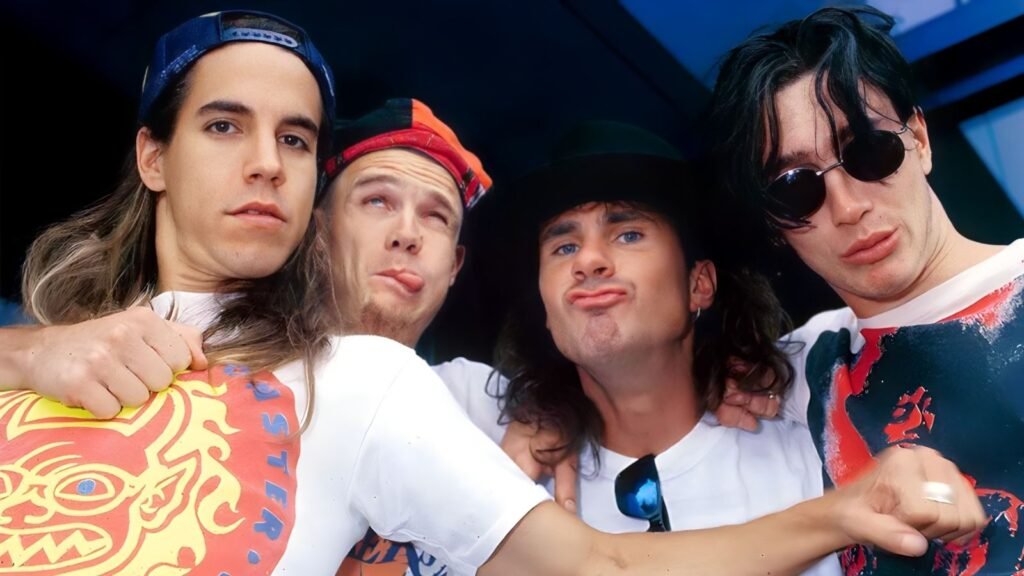
The Chili Peppers have been releasing records since the early ‘80s, but it’s their ‘90s collection which stands out from their 13-album-long discography. Heralded as the band’s unequivocal high-point, this decade saw the release of 1991’s Blood Sex Sugar Magik, 1995’s One Hot Minute, and 1999’s Californication (the first and last of which are often credited as the best records ever released by the band), supported by a tapestry of hit singles such as Give It Away, Under The Bridge and Around The World.
Their sound flip-flopping from psychedelic funk to alternative rap rock, the band’s legendary bassist, Flea, revealed the vibrant inspiration behind the band’s sound in his 1998 interview with Bass Frontiers: “I think without passion it’s ridiculous to play. For me, if you don’t play with your heart, you have nothing to say, and if you have nothing to say, you should shut up […] I’m always listening, and I’m always open minded. I’m always looking for something beautiful, whether it’s music or otherwise.” It’s attitudes like this that make bands legendary and make Red Hot Chili Peppers one of the most respected, far-reaching, and best rock bands of their era.
15. Pantera
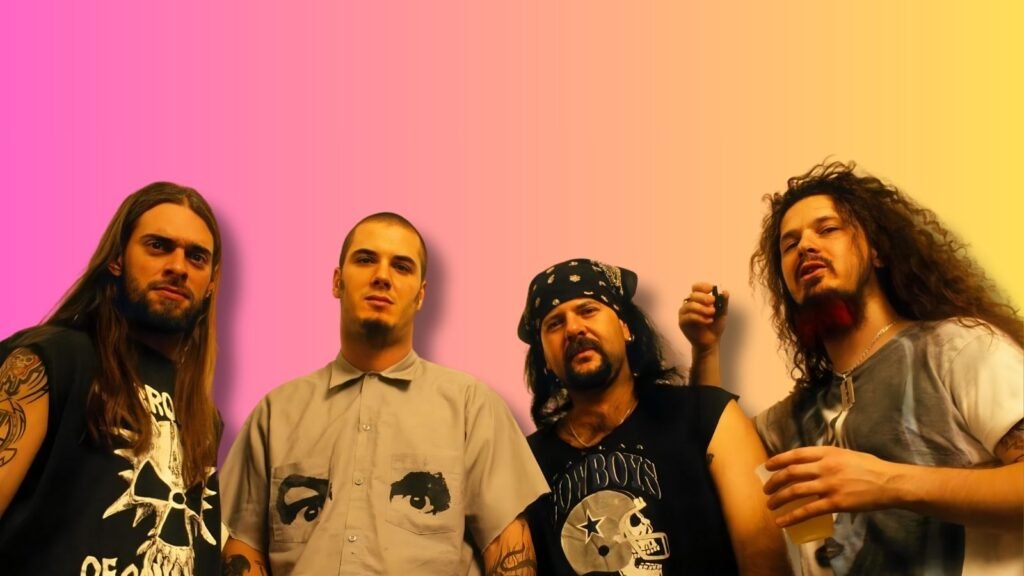
After releasing a series of albums between 1983-1988, Pantera’s greatest commercial success spawned from their 1990 record, Cowboys From Hell — a title as infamous as the band’s relentless sound. This decade saw Pantera refine their direction from glam to groove metal, maturing in time with the scene around them yet constantly staying on top of their game.
Pantera shone a darker shade over the alternative scene; combating the power chord wave with a fearless exploration of musical technicality, making them stand out from their surrounding 90s rock artists, even to this day.
16. Cradle Of Filth
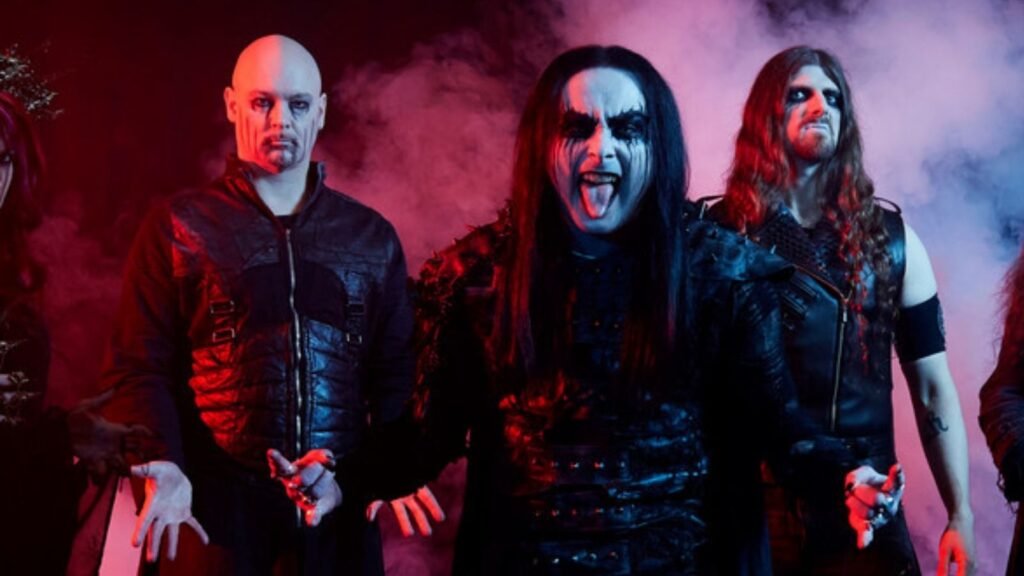
We admit Cradle of Filth is far more metal than rock, but with the extreme forces of Gothicism and deep-set controversy closely on their tails, this band’s early records highlight the ‘90s rock scene’s affiliation with the Satanic Panic and with breathtaking style.
From the sour taste of the band’s iconic ‘90s “Jesus Is A C***” t-shirt to the black metal terror underlying their earliest albums, Cradle Of Filth soaks each track in shock factor, devilish enchantment, and poetic perceptions of mythology. Their initial spiderweb of records, from 1994’s The Principle of Evil Made Flesh to 2000’s Midian, is the inarguable high-point of the band, distinct from their later downfall and showcasing the mystifying horror of Dani Filth’s vocals at their utmost best.
17. Nine Inch Nails
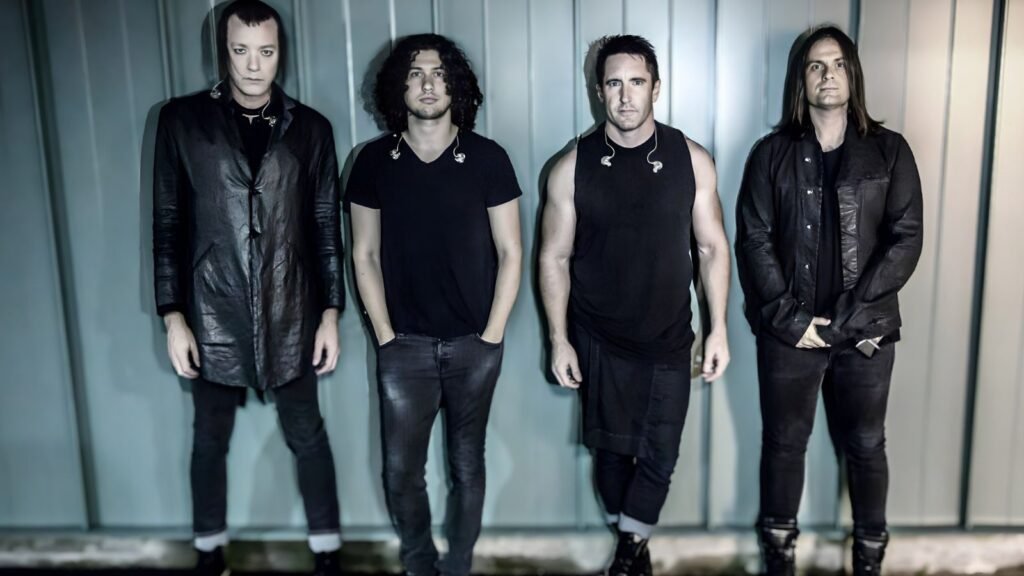
With a steady stream of releases between 1989 and 2020, Nine Inch Nails’ all-time greatest record is undoubtedly 1994’s The Downward Spiral — a relentless album of bedlam and subtlety, encircling a disturbing concept of self-destruction.
Despite their industrial snowstorm of sound, NIN found shocking levels of commercial success with this release, bringing together the mainstream rock world and the cavernous obscurities of industrial metal into one indomitable force. The Downward Spiral lives on for daring to break the mold of 90s rock music, a harrowing musical adventure undercut with profound messages and themes as bleakly relatable as their peers.
18. Slipknot
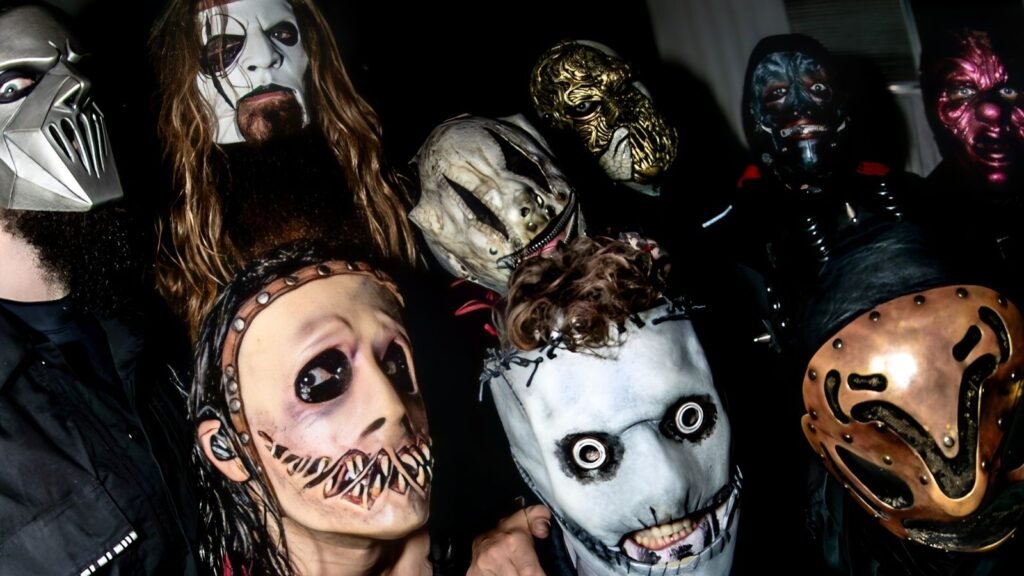
Slipknot might not fit perfectly into a ‘rock band’ list, but the nu-metal nine-piece’s debut record — the self-titled 1999 Slipknot — ended the decade with chaos unbeknownst to the alternative community. Their first two albums forming the original, corrupted soul of the band, we’ll let Slipknot edge onto our list for creating one of the most manic rock records of our generation, debuting a sound that evolved like a Lovecraftian monster, transfixing the scene from their first spread of ‘99 singles, and steering the sonic aesthetics of the mainstream alternative into the wilderness of the new, 21st century.